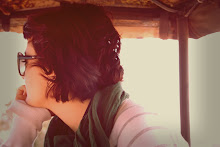Nepalis, as I had heard before, are very warm welcoming people, always with a smile on their face and wondering what they can do for you.
When I arrived at Raksha, I found that I had three sisters. Here, the people you build strong relations with become borthers and sisters. My new family is made up by: Menuka didi (big sister) who is Raksha's president and the creator of it all, Goma bahini and Ishwori bahini, my two little sisters.
Raksha is also a shelter home for 20 other women who have gone through difficulties and desire an opportunity for change. The main sector of beneficiaries are women compelled to work in the entertainment sector (massage parlors and dance restaurants where sex work is envolved), but the shelter is also opened to other women victims of domestic violence, conflict victims, victims of girls trafficking and those helpless or very vulnerable women who wish to have the opportunity to make a change in their lives.
Through vocational training, education and awareness building in HIV, STDs, women's rights and other legal provisions, Raksha offers support to these women and an alternative livelihood. Raksha also provides education for their children in order to promote a safe growing environment for them.
Living with Raksha girls offers me the opportunity to integrate in real nepali life.
This means having my two rice plates with vegetables a day, in fact, for Nepali people, a meal means eating rice, when there is no rice, it's only like eating a snack for them. It means also bucket showering and if you don't want to freeze, it means having to wait until the sun has warmed up a little bit the water tanks thanks to the solar panels on the roof, means having dairy 2 hours energy cut in the evenings, means having good smelling incense sticks burning at the gaps of the doors every morning (part of their prayer and offering to god), means working everyday but the Saturdays, means becoming an English teacher with no books during extra working hours as everyone here wants to learn and asks me to teach, means adapting to nepali rhythm, unconceivable working rhythm if we look at it through our occidental eyes...
I have to say that at least it does not mean having to wake up at 5am as my sisters do!
In terms of working issue, adapting to the new culture was not as easy as I thought. At first, I was frustrated about nepali rhythm, about not understanding my role here, about not seeing clearly how was Raksha's project doing or even how does the NGO work. Now the sky is much clearer, after sharing with some staff our questions and concerns, I am adapting to their timing and the working hours flow smoother.
*-Part of the staff-*
 My job here is not about changing the world within the messed up international situation, but it's about changing some people's life. Having Goma laughing while learning English, Ishwori smiling when we look at Saturday's pictures on the computer, or Parvati, one of the shelter girls, blushing and shyly smiling when there is a piece of chocolate for after dinner, makes me feel loved, fulfilled and strong to keep up sharing my days with these people on the other side of the world.
My job here is not about changing the world within the messed up international situation, but it's about changing some people's life. Having Goma laughing while learning English, Ishwori smiling when we look at Saturday's pictures on the computer, or Parvati, one of the shelter girls, blushing and shyly smiling when there is a piece of chocolate for after dinner, makes me feel loved, fulfilled and strong to keep up sharing my days with these people on the other side of the world.I'm leaving you for now, I have to go to my first nepali lesson! I am very excited!!!!
